9 of the Best Quotes from Slavoj Žižek
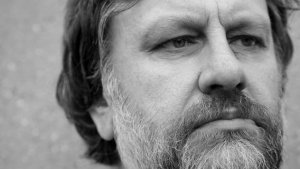
Slavoj Žižek is a Slovenian philosopher, psychoanalyst, and sociologist who has achieved notoriety all over the world thanks to his sharp, profound perspective on today’s world. He uses fresh, clever language to explain his arguments, awarding him recognition and prestige in the public eye.
Žižek’s approach is a mix of dialectical materialism principles and Lacanian psychoanalysis. His intention is to explain current popular culture. He denounces the ideological traps of power and their manifestations. He seeks to understand new realities better. And he does all this with simplicity and a sense of humor.
“I am not naive, nor unrealistic; I know there won’t be a great revolution. In spite of all that, we can do useful things, like put limits on the system.”
-Slavoj Žižek-
One of the most interesting things about Žižek is that he draws from film and literature to illustrate his ideas. Specifically, he frequently uses Alfred Hitchcock and David Lynch films. He also quotes Shakespeare, Kafka, and Lenin with ease.
Žižek is an anti-system philosopher. His ideas propose and promote an attitude of resistance to consumerism and the injustices of the economy. He is also a self-declared enemy of political and religious fundamentalists. Some categorize him as an anarchist, but in reality he is, above all, a sharp critic of current times. These are some of his most interesting ideas.
A life devoid of sustenance
It seems like today the world encourages us to exist in such a way that we don’t touch life. Žižek says as much in this extraordinary reflection: “It seems that, more and more, on every level, we are living a life devoid of substance. We drink alcohol-free beer, fat-free meat, caffeine-free coffee, and eventually virtual sex…with no sex.”
In this text, Žižek is describing the modern-day position of rejecting everything “negative” as if every reality didn’t have pros and cons. Absolutely everything implies a loss and a gain, even these sterile ideas. In this sense, trying to avoid all “bad” things is nothing more than childish paranoia.
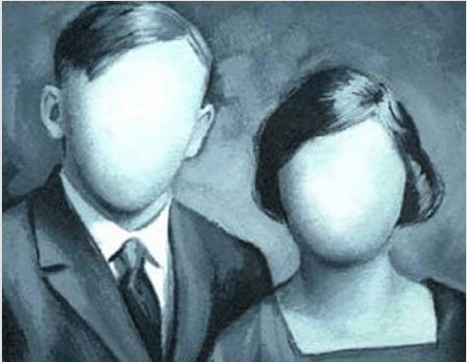
Change systems, not people
Žižek believes that an individual is largely shaped by his or her surroundings. And that it’s difficult to tell if our thoughts and actions are ours or the product of structural influence. Žižek says “You can’t change people, but you can change the system so that people aren’t pushed to do certain things.”
What he is trying to emphasize is that many behaviors are provoked by the systems of relationships, values, and beliefs. Individuals develop in that context. That’s why, if you want to cause individual changes, you have to also transform the context.
Inaction is allowing others to act
Power works on people in different ways. This same power is what produces a passive or indifferent attitude in some human beings. This idea is clear in the following Žižek quote: “Not doing anything isn’t a neutral thing, it has a meaning: it is saying “yes” to the existing relationships of domination.”
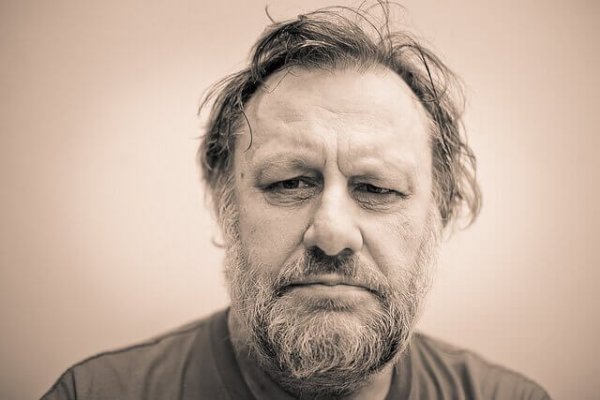
We can apply this to everyday situations as well as on a larger social scale. Inaction, lack of active intervention, is a way of accepting the predominating conditions. Power is what imposes said conditions, with the goal of perpetuating itself.
The same can be said about our private lives. If we remain passive, we are obeying the expectations of our family or our close friends. It is the manifestation of totalitarianism in our private lives.
Love, a misfortune
Žižek diverges from a romantic vision of love. On the contrary, he assigns love a heartbreaking role: “We experience love like a great misfortune, a monstrous parasite, a permanent state of emergency that ruins small pleasures.”
This statement isn’t a rejection of love, nor a call to avoid it. It is more of a complaint. On one hand, love gives fullness. But on the other hand, it tears us up inside. This isn’t negative, it is simply part of being human.
Fail better each time
Žižek says that we shouldn’t be afraid of failing in our attempts. He says the worst failure is to not try at all, as this quote expresses: “After failure, it is possible to keep going and to fail better. Indifference, on the other hand, sinks us further and further into the quagmire of stupidity.”
Trying, whether you fail or not, allows you to improve. You learn and you grow. Whereas if you fall into a passive and indifferent pattern, the opposite occurs. Then you are dealing with a decline into total stagnation. Passivity means death of the conscience.

Global thought systems
Large thought systems that see themselves as universal dominate history. Now, we find ourselves in a different time, as Žižek captures here: “We shouldn’t aspire to political systems that explain everything or projects that seek global emancipation; the violent imposition of large solutions should give way to specific intervention and resistance.
Thought systems that believe themselves to be universal are ignoring many details. In fact, violence often imposed them. Now is the time to look at what makes us different, not what makes us all the same.
Competition and comparison
This wonderful text from Žižek complains about a current palpable reality: “We are trapped in unhealthy competition, in a ridiculous net of comparison to others. We don’t pay enough attention to what makes us feel good because we are obsessed with measuring if we have more or less pleasure than everyone else.”
We are living in a time when we submit ourselves to social approval and sanction more than ever before. Many people define their actions and value by comparing them to others.
In this case, the point isn’t to find what personally gratifies you. It is to see if your gratification is superior or inferior to that of others. What gives us happiness is being better than other people, more than experiencing a feeling of self-actualization.
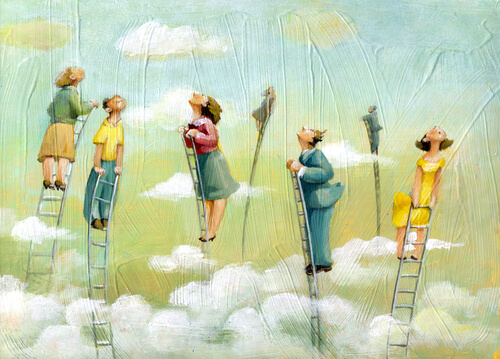
The role of philosophy
Currently, philosophy isn’t knowledge designed to reveal great truths. In the eyes of Žižek, its role is more that of questioning and cracking open “absolute truths.” Here’s how this idea is expressed: “Philosophy doesn’t find solutions, it poses questions. Its main task is to correct the questions.”
In an age when uncertainty rules, philosophy contributes more by asking than responding. Deep and well-aimed questions get us closer to more accurate answers. In that sense, maybe we haven’t found the right questions. That is precisely the task that philosophy should tackle.
No to prophets, yes to leaders
Agents of “revealed truths” do more harm than good. They cause people to hold up absolutist or totalitarian ideas that lead to new forms of slavery. That’s why Žižek says: “We don’t need prophets, but leaders who encourage us to use our freedom.”
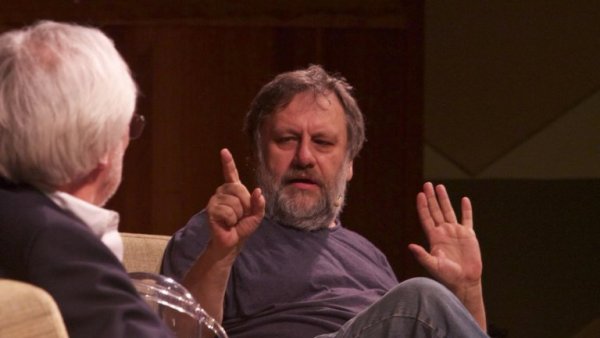
The role of a contemporary leader is to help others freely define their path, not blindly follow the plans of a man or a group. A true leader encourages autonomy from the people she is guiding. She encourages everyone to be their own leader.
Žižek is one of the great thinkers of our time. His reflections help us understand a world that has become too complex and sometimes erratic. Without a doubt, he is required reading for all of us who are looking to reset our compasses in this disorienting age.
Slavoj Žižek is a Slovenian philosopher, psychoanalyst, and sociologist who has achieved notoriety all over the world thanks to his sharp, profound perspective on today’s world. He uses fresh, clever language to explain his arguments, awarding him recognition and prestige in the public eye.
Žižek’s approach is a mix of dialectical materialism principles and Lacanian psychoanalysis. His intention is to explain current popular culture. He denounces the ideological traps of power and their manifestations. He seeks to understand new realities better. And he does all this with simplicity and a sense of humor.
“I am not naive, nor unrealistic; I know there won’t be a great revolution. In spite of all that, we can do useful things, like put limits on the system.”
-Slavoj Žižek-
One of the most interesting things about Žižek is that he draws from film and literature to illustrate his ideas. Specifically, he frequently uses Alfred Hitchcock and David Lynch films. He also quotes Shakespeare, Kafka, and Lenin with ease.
Žižek is an anti-system philosopher. His ideas propose and promote an attitude of resistance to consumerism and the injustices of the economy. He is also a self-declared enemy of political and religious fundamentalists. Some categorize him as an anarchist, but in reality he is, above all, a sharp critic of current times. These are some of his most interesting ideas.
A life devoid of sustenance
It seems like today the world encourages us to exist in such a way that we don’t touch life. Žižek says as much in this extraordinary reflection: “It seems that, more and more, on every level, we are living a life devoid of substance. We drink alcohol-free beer, fat-free meat, caffeine-free coffee, and eventually virtual sex…with no sex.”
In this text, Žižek is describing the modern-day position of rejecting everything “negative” as if every reality didn’t have pros and cons. Absolutely everything implies a loss and a gain, even these sterile ideas. In this sense, trying to avoid all “bad” things is nothing more than childish paranoia.

Change systems, not people
Žižek believes that an individual is largely shaped by his or her surroundings. And that it’s difficult to tell if our thoughts and actions are ours or the product of structural influence. Žižek says “You can’t change people, but you can change the system so that people aren’t pushed to do certain things.”
What he is trying to emphasize is that many behaviors are provoked by the systems of relationships, values, and beliefs. Individuals develop in that context. That’s why, if you want to cause individual changes, you have to also transform the context.
Inaction is allowing others to act
Power works on people in different ways. This same power is what produces a passive or indifferent attitude in some human beings. This idea is clear in the following Žižek quote: “Not doing anything isn’t a neutral thing, it has a meaning: it is saying “yes” to the existing relationships of domination.”

We can apply this to everyday situations as well as on a larger social scale. Inaction, lack of active intervention, is a way of accepting the predominating conditions. Power is what imposes said conditions, with the goal of perpetuating itself.
The same can be said about our private lives. If we remain passive, we are obeying the expectations of our family or our close friends. It is the manifestation of totalitarianism in our private lives.
Love, a misfortune
Žižek diverges from a romantic vision of love. On the contrary, he assigns love a heartbreaking role: “We experience love like a great misfortune, a monstrous parasite, a permanent state of emergency that ruins small pleasures.”
This statement isn’t a rejection of love, nor a call to avoid it. It is more of a complaint. On one hand, love gives fullness. But on the other hand, it tears us up inside. This isn’t negative, it is simply part of being human.
Fail better each time
Žižek says that we shouldn’t be afraid of failing in our attempts. He says the worst failure is to not try at all, as this quote expresses: “After failure, it is possible to keep going and to fail better. Indifference, on the other hand, sinks us further and further into the quagmire of stupidity.”
Trying, whether you fail or not, allows you to improve. You learn and you grow. Whereas if you fall into a passive and indifferent pattern, the opposite occurs. Then you are dealing with a decline into total stagnation. Passivity means death of the conscience.

Global thought systems
Large thought systems that see themselves as universal dominate history. Now, we find ourselves in a different time, as Žižek captures here: “We shouldn’t aspire to political systems that explain everything or projects that seek global emancipation; the violent imposition of large solutions should give way to specific intervention and resistance.
Thought systems that believe themselves to be universal are ignoring many details. In fact, violence often imposed them. Now is the time to look at what makes us different, not what makes us all the same.
Competition and comparison
This wonderful text from Žižek complains about a current palpable reality: “We are trapped in unhealthy competition, in a ridiculous net of comparison to others. We don’t pay enough attention to what makes us feel good because we are obsessed with measuring if we have more or less pleasure than everyone else.”
We are living in a time when we submit ourselves to social approval and sanction more than ever before. Many people define their actions and value by comparing them to others.
In this case, the point isn’t to find what personally gratifies you. It is to see if your gratification is superior or inferior to that of others. What gives us happiness is being better than other people, more than experiencing a feeling of self-actualization.

The role of philosophy
Currently, philosophy isn’t knowledge designed to reveal great truths. In the eyes of Žižek, its role is more that of questioning and cracking open “absolute truths.” Here’s how this idea is expressed: “Philosophy doesn’t find solutions, it poses questions. Its main task is to correct the questions.”
In an age when uncertainty rules, philosophy contributes more by asking than responding. Deep and well-aimed questions get us closer to more accurate answers. In that sense, maybe we haven’t found the right questions. That is precisely the task that philosophy should tackle.
No to prophets, yes to leaders
Agents of “revealed truths” do more harm than good. They cause people to hold up absolutist or totalitarian ideas that lead to new forms of slavery. That’s why Žižek says: “We don’t need prophets, but leaders who encourage us to use our freedom.”

The role of a contemporary leader is to help others freely define their path, not blindly follow the plans of a man or a group. A true leader encourages autonomy from the people she is guiding. She encourages everyone to be their own leader.
Žižek is one of the great thinkers of our time. His reflections help us understand a world that has become too complex and sometimes erratic. Without a doubt, he is required reading for all of us who are looking to reset our compasses in this disorienting age.
This text is provided for informational purposes only and does not replace consultation with a professional. If in doubt, consult your specialist.







